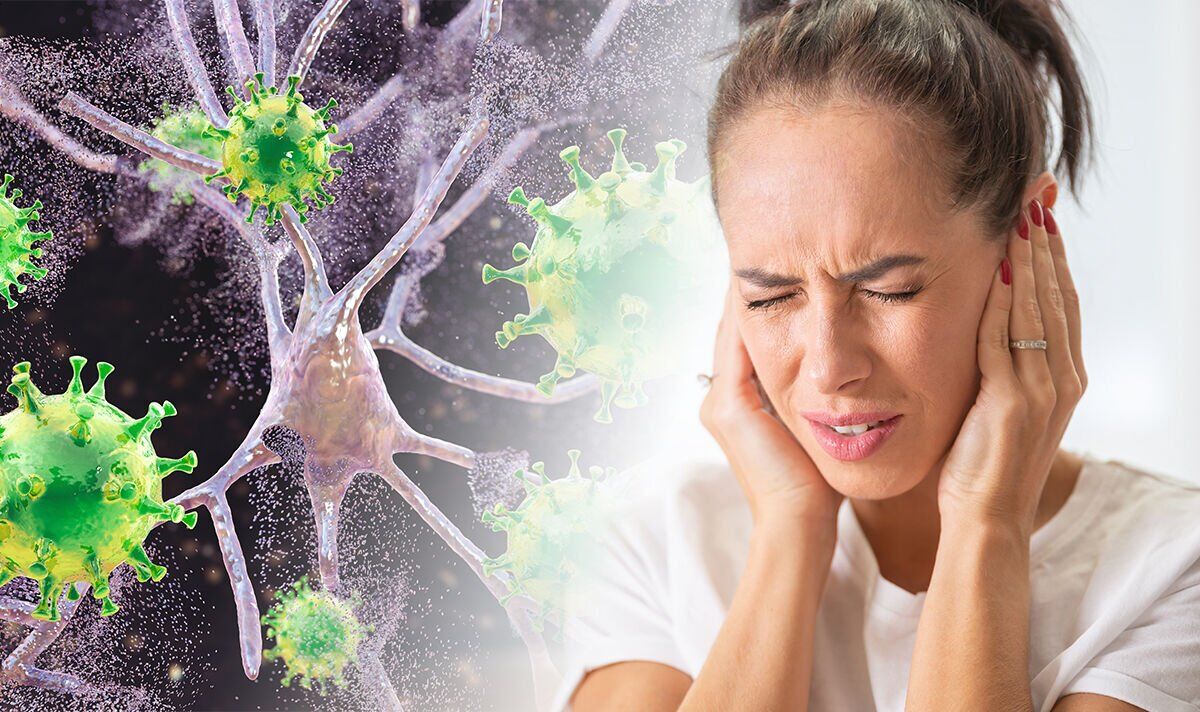COVID-19 is a pernicious and multifaceted viral foe with the ability to affect almost every part of the body from how it breathes to how it thinks, and now, to how it hears. Researchers from King’s College London’s ZOE Covid survey have noticed more and more people are developing tinnitus as a result of a Covid infection. Co-founder of the study, Professor Tim Spector, says the symptom should be taken “really seriously” as it indicates the virus has found new ways to attack the body. Tinnitus occurs when a person experiences a noise without an outside source over a prolonged period; the most common form of tinnitus is ringing.
Speaking about the development of the new symptom Professor Spector said: “It turns out that 19 percent, or nearly one in five, has ear problems with Covid, and in our newsletter we got 14,500 to complete the survey and we had about 5,000 test positive for Covid and had the ear ringing.
“What we learned from this was that for a few it lasted only a couple of days, and most people, over 50 percent said they were still experiencing some form of ear ringing that comes and goes and is mild or moderate for weeks or months afterward.
“It was a bit of a shock to me; it was something I thought went. I did get it but it disappeared pretty quickly.”
Professor Spector now says tinnitus should be added to the list of symptoms associated with long Covid.
READ MORE: Vascular dementia: Symptoms may ‘fluctuate and worsen rapidly’
Close to two million people are now living with long Covid in the UK; the equivalent of more than one in 38 people.
Professor Spector said the findings from the ZOE Study highlight “the first time that ear ringing as with long term loss of smell…is something to take seriously because it does suggest that a different part of the body is being affected, more internal and close the brain”.
Furthermore, the Professor added they had “heard anecdotally from ENT colleagues they have seen an increase in referrals for tinnitus following Covid”.
The discovery of an increase in the rates of tinnitus marks another breakthrough for the ZOE Covid study, one that has been running since the pandemic began and proved essential for helping to track the changes of the virus.
DON’T MISS
Although Government funding for the study has now been cut as part of their Living with Covid plan, the study continues to track how the virus is changing and the ways in which it is affecting the body.
It was in large part thanks to this study the NHS symptoms list was expanded from three to nine earlier this year.
What this latest data provides is a further insight into long Covid, the latest condition to join the pantheon of chronic diseases.
Long Covid, much like its mother infection COVID-19, is unpredictable; patients report their symptoms varying from day to day.
So far there is currently no treatment for long Covid.
Although there is no breakthrough in treating long Covid, scientists have recently identified one of the methods people can reduce their risk; getting vaccinated.
Researchers from the Office for National Statistics (ONS) recently discovered those who had had two vaccine doses were less likely to develop long Covid than those who hadn’t.
Furthermore, they also discovered the Omicron variant was less likely to cause long Covid than the previously dominant Delta variant.
In a statement, the ONS said: “Among double-vaccinated, adult study participants, the socio-demographically adjusted prevalence of self-reported long Covid four to eight weeks after a first coronavirus infection compatible with the Delta variant was 15.9 percent.
“This is compared with [over] eight percent for infections compatible with the Omicron BA.1 variant.
“Among triple-vaccinated adults, there was no statistical evidence of a difference in the adjusted prevalence of self-reported long Covid between first infections compatible with the Delta variant and those compatible with either Omicron BA.1 or Omicron BA.2.
“However, the adjusted prevalence was higher for infections compatible with Omicron BA.2 than it was for those compatible with Omicron BA.1.”
